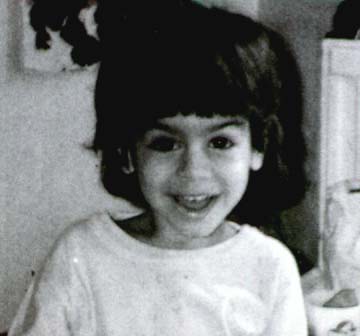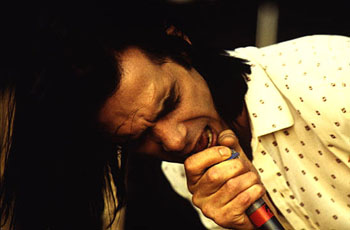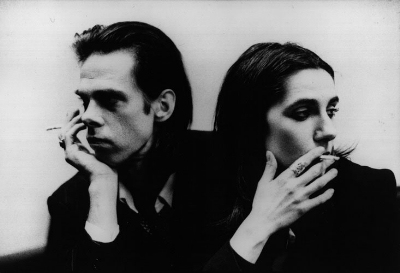|
Since leaving Australia more than a decade ago with the Boys Next Door who soon changed their name to the Birthday Party, singer, songwriter and novelist Nick Cave has lived in West Berlin, New York, Los Angeles, Sao Paolo and London. Not only has constant motion kept him one step ahead of cults that would claim him, his restless creative impulse has necessitated him working across a range of disciplines. Born near Wangaratta in Victoria, Cave grew up, with one sister, in polite suburban Melbourne. His mother was a librarian, and his father was a school headmaster. The young Cave wanted to paint.  "The actual music side of things, I never felt I was any good at it, I never felt I had any authority on the subject, or right to be in the business," he confesses. "I couldn’t sing, couldn’t hold a melody, I had a weak voice - no sense of music whatsoever. Obviously, I’ve developed a bit since then." The Boys Next Door, rather then being inspired by punk, were a teenage garage band that cut it’s teeth in the early 70s on Alice Cooper, Alex Harvey and Chuck Berry. Nick Cave, Mick Harvey, Tracey Pew and Phil Calvert met in art classes at Melbourne’s Caulfield Grammar. Roland Howard joined the already established Boys Next Door in the late 70s. "None of us sang," recalls Harvey, "so I think we decided we needed a singer, and Nick, of course despite the fact that he couldn’t sing, was kind of the type of personality who had to be a singer." Cave, then became the singer of the Boys Next Door. They changed their name to the Birthday Party and soon after that they moved to London. The impact Cave and the Birthday Party made on the underground British music scene of the early 80s is still felt. The Birthday Party carved out a unique elemental style - equal parts violence and poetry. Although they may have spawned a Gothic following, they were themselves too hard for a spotty cult which preferred softer options like the Cure. Britain has not yet come to terms with what the Birthday Party did to rock, nor has their home country, Australia.  On their side, the Birthday Party were unimpressed by a British scene mostly prepared to sacrifice the music’s passion, raw emotion, wit, intelligence and essential dumbness for a quick hit. They made their first move to West Berlin, where, as always they were implosive as they were explosive, they eventually fell apart. Cave took the break up as an opportunity to shake off the unwanted ‘goth’ cult that named the Birthday Party as its mentors. Cave went to Los Angeles to write a film script about killer/prison theorist Jack Henry Abbott, the author of "In The Belly of The Beast". It was later to become the prison picture "Ghosts…Of The Civil Dead", made with director John Hillcoat and producer Evan English who expanded the story to comment on the prisoner-guard tendency of contemporary society. In the meantime Cave recorded his first Bad Seeds LP "From Her To Eternity". The Bad Seeds are, if anything, more resourceful in constructing vivid musical backdrops to Cave’s song narratives. In Berlin, Cave completed his first novel, "And The Ass Saw The Angel", a dense and accomplished story written in the voice of a criminal idiot hounded by a mob. During his stay, he befriended director Wim Wenders, who keyed the most significant emotional changes in his worldwide hit film, "Wings Of Desire" with two Nick Cave songs. He also asked Cave to contribute the title song to his latest film, "Until The End Of The World". His film work, incidentally, took on a further dimension when Cave appeared in "Johnny Suede" a film funded by Robert Redford’s Sundance foundation. The death in November 1986 of the larger-than-life Tracey Pew, who was closer to Cave’s soul mate than anyone in the Birthday Party, was a real tragedy. Cave left West Berlin shortly before it’s fall in 1989. He moved to Sao Paolo. The Brazilian city was perhaps the first city to have direct affect on the mood of his songs. Much of his LP "The Good Son" was devoted to trying to capture the strong feelings suggested by the Portuguese word Saudade, meaning something like yearning or longing.  After finishing "The Good Son", Cave thought it would be a good idea to fix his drug addiction. "To tell the truth," says Cave, "I actually didn’t want to kick drugs. It was the last thing on my mind to do. I had problems with being busted a couple of times, and basically it was either that or prison, and that’s why I went into the clinic. Eventually I came to the realisation that it was the best thing. But I went in screaming and kicking." Nick Cave’s seventh album "Henry’s Dream" was released in 1992 to what was undoubtedly and deservedly his greatest critical acclaim. It was recorded in Los Angeles, New York and Melbourne. Much of 1992 was spent touring. Covering Europe, the States, Japan and Australasia. The tour saw Nick Cave and The Bad Seeds at their live best. This tour also brought up the idea of a live album. "Live Seeds" was recorded during various concerts in Europe and Australia. The "Live Seeds" tour marked a number of firsts for the Bad Seeds, not the least being their visit to Israel, where their records outsell the Rolling Stones and their performance pulled twice as many people as Bob Dylan’s at the same venue. Ever moving Nick Cave returned to London in the spring of 1993 to begin working on an album for release in the new year. The Bad Seeds next album was "Let Love In". Cave’s compositions rip into the entrails of love. It’s not uncommon for Cave to swing between the two extremes within a single song.  Nick Cave and the Bad Seeds’ tenth LP was "Murder Ballads". Released in 1996, it contained duets with Kylie Monogue, PJ Harvey, Anita Lane and many others. It offered a break to the band for they were unable to promote it with a tour. Following this release came their latest album, "The Boatman’s Call", a quieter album than the previous release. The difference between the two styles of music of the Birthday Party and Nick Cave and the Bad Seeds is remarkable and shows how talented Cave is, to be able to develop and write the lyrics for the two completely different styles. He has become a widely respected solo artist - possibly Australia’s most respected international success story. Having freed himself of so many shackles - youthful affectations, drug addiction and expectations from all directions - it may be that Nick Cave has achieved his long standing ambition of ‘total honesty’. Nick Cave: vocals Roland S Howard: guitar, saxophone Mike Harvey: guitar, bass guitar, organ, drums Tracy Pew: bass guitar Phill Calvert: drums Bad Seeds - Band Members
Comments and other problems then email me. |
Nic Dalton | Godstar | Juliana Hatfield | Other Bands | Home
